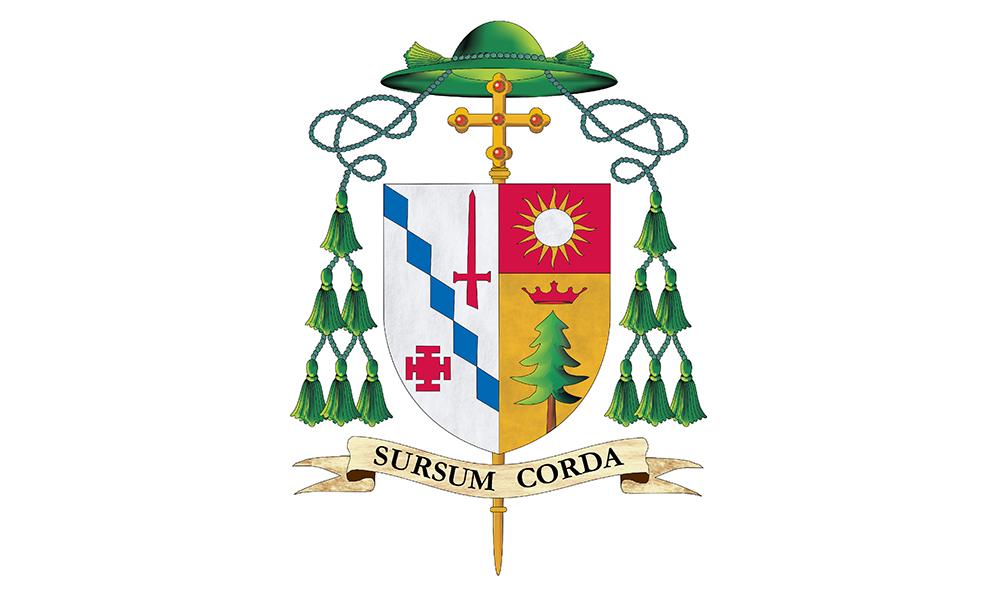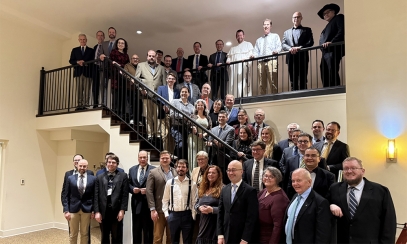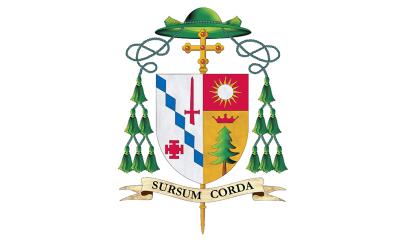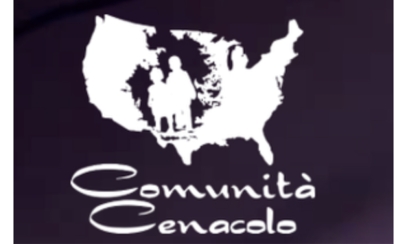
Our victory: Living life for Christ
On Nov. 5, Bishop Raica traveled to Holy Spirit Catholic Church for a pastoral visit. Marking the 31st Sunday of Ordinary Time, the bishop celebrated Mass at the parish. The complete text of his homily follows herein.
On Nov. 5, Bishop Raica traveled to Holy Spirit Catholic Church for a pastoral visit. Marking the 31st Sunday of Ordinary Time, the bishop celebrated Mass at the parish. The complete text of his homily follows herein.
My sisters and brothers, in the wake of the World Series with the Texas Rangers victorious over the Arizona Diamondbacks this past week, both Alabama teams won, and an unusual arctic blast reached us here in the South, we are now beginning the rapid slide – the blur into Thanksgiving, Advent, Christmas, and New Year’s. Today, I have the great honor for a pastoral visit – to pray with you by celebrating Mass this Sunday morning here at Holy Spirit Parish and meeting many of you. Usually, I visit only for some special event like Confirmation or deanery meetings. So, today it gives me great pleasure to be here in Huntsville today. I especially thank Father Mike, Father Daniel, and Father Jose for their extraordinary welcome and hospitality that has become a legendary feature here at Holy Spirit Parish.
Our readings begin to shape some ideas about leadership today. There is no subject about which people today have stronger opinions, than about their leaders – elected leaders on local, state, and national levels, leadership teams at work, as well as their religious leaders from the top down. When we consider leaders, we look for someone who will represent us fairly, who will listen and take into account our concerns, who will be coherent in life, who will lead us in a forward direction, who will make sure we are secure and our families protected, someone who will guide and direct the interest of the common good or our welfare so we can live full, meaningful, and productive lives.
We have seen the deleterious results of greed, pride, egocentrism, tyranny, the lack of accountability, those who take advantage of their position or authority, or those who have compromised their positions, to name a few.
This Sunday’s readings present the contrast between those who are serious about their humanity and their positions of authority and those who neglect or disregard it to the detriment of others.
Let’s take the Gospel: Our Lord scolds and challenges the religious authorities for their penchant to lay heavy burdens on others while they won’t lift a finger or offer relief in return. In a sense, they preach what they do not practice. We prefer that leadership preach what they are practicing so that their words will be genuine and sincere.
Paul in his writings reminds one of our earliest communities, the Thessalonian Christian community, that he proclaimed the Gospel of Christ, the Word of God, day and night, not to create another burden on their lives but to introduce to them the freeing power of God’s abiding presence.
The first reading, similarly, from the prophet Malachi recounts those leaders whose lives are not integral or coherent, resulting in hardship for everyone.
This is the challenge of leadership today, whether it be in the secular world or in the religious world (and I include myself in this sort of examination of conscience). Am I living the life I have accepted as totally and completely as possible? Where do I need to grow? What do I need to transform to make my life even more authentic, more credible? In other words, is the way Christ proposed possible? We can ask ourselves as believers who come here week after week, “Is it possible to live this new way as a Christian and, is it really, truly possible to live this new way that Christ offers?”
But, what precisely is this life that Christ proposed? Is it merely learning all the rules and obeying them? One doesn’t have to be Christian or a believer to follow rules – societal or ethical or moral. Even good non-believers do it! Is it being able to articulate everything in the Catechism or writing an erudite essay on some obscure teaching or aspect of faith life? There are many who already do – some of whom are not even believers. So, it can’t be that! Is it trying to find the one magic formula, an ultimate solution, that oftentimes self-help books try to articulate that will answer all of life’s problems? The disciples and Apostles in the early Church didn’t have a manual to follow to start the new faith communities. They probably had no idea what a church building looked like nor did they attend seminars on the “Seven Habits of Highly Effective Disciples.” Sometimes, we think that it can be our attempt to create the “perfect” ordered society or culture, imposing it on everyone according to someone’s definition of what “perfect” and “ordered” is. The author T.S. Eliot observed that at times it is as though we are trying to create a society so perfect that no one will need to be good! For an imposed order, we give up our freedom!
But throughout the ages, there is one solution that I am aware of that has brought consolation to many, provided hope to the hopeless, inspired many to live extraordinarily saintly lives, and moved sinners to become saints. That solution is the amazing encounter with Christ – an encounter that has changed lives, given hope, provided certainty for the future. It is not an encounter that merely ended with the cross 2,000 years ago when everyone ran away. It is still happening today. For that reason, gathering here as a community gives me the hope. I can carry on one more day, one more week because we are looking in the same direction for the gaze of Christ in our lives. We encounter Christ in the challenging words we hear in the Gospel. We encounter Christ in the Eucharist – where the unlikely, simple elements of bread and wine, through the eyes of faith, become for us truly the Body and Blood of Jesus our Savior, present with us! The encounter with Christ is not intended to add burdens, but to recognize the authenticity of who I am in relationship to and made for Another!
Over the years, I’ve shared my life, my upbringing in Michigan’s Upper Peninsula, the joys and challenges that I had in my life, the impact of my parents and family, the encouragement I’ve received from religious leaders, priests and women religious who have inspired me to know that, while everything is not perfect, Christ is still at the helm. Through all of this, I can affirm that it is possible to live this way, and, like the Apostles and disciples of Christ, it is worthwhile to risk everything to follow this Man Who promises something I cannot give myself, eternal life. So, my hope is not in the failings, imperfections, or shortcomings of leaders – secular, religious, or parochial. My hope is in the One Who saves and is most concerned about my humanity and destiny – Jesus Christ, whose mercy continues to lift me up as a Christian and inspires me as a priest.
Finally, let me bring this into home base by offering this moving reminder from St. Joan of Arc. She is credited with a challenging statement that affects all by putting out a very basic belief.
Just before her death she wrote: “I know this now. Every man gives his life for what he believes. Every woman gives her life for what she believes. Sometimes people believe in little or nothing, and yet they give their lives to that little or nothing. One life is all we have, and we live it as we believe in living it and then it’s gone. But to surrender what you are and to live without belief is more terrible than dying – even more terrible than dying young.”
Whether one is a leader or not, the fundamental stance of every human being is this: What is it we give our lives for? What is it that we are willing to commit to? How do we commit and keep ourselves committed, like the disciples, to having met Christ, Who has changed everything. He has given us the prospect of living eternally and in abundance. This was the challenge of Christ to religious leaders. This was the challenge of believers through the ages that we remembered on All Saints. It is our challenge today as we pray for perseverance and a deepening of the commitment of faith we’ve made. That will be the World Series for us. That will be our victory. That is our ultimate goal - the promise of Christ: You will live forever. (cf. Jn 11:25 passim).



